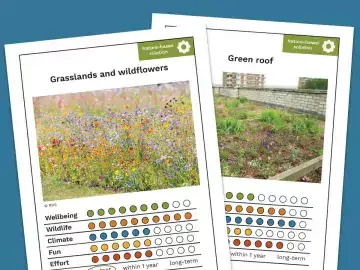
Write a poem
This activity, created in collaboration with the Poetry Society, encourages children and young people to imagine the future of their space through the process of poetry. Learners will read a poem by Dom Conlon and respond to it with their own ideas and feelings of what they’d like their site to include for future generations.
This activity will help learners to create a vision for their Nature Park through writing a poem, and imagine the impact of changes on people and nature in the future.
If learners haven’t had an opportunity to do so already, give them a short time to explore their site in preparation – try out the Hidden Nature Challenge or Biodiversity bar charts activity.
Preparation
What you need
- “New Gold” by Dom Conlon
- Plain or lined sheets of paper
- Pencils and pens
Location
- Indoors
Useful guidance
Step by step
- Give learners a copy of “New Gold” by Dom Conlon, one between pairs. Read through the poem together, and then discuss with your class – how does it make you feel? What does it make you think of? If we were sending a message about our learning site in the future, what would we want to tell people?
- From the information you’ve collected so far about your site, and the opportunities for change, you can start to write down ideas for your vision. Ask learners to spend five minutes making an idea cloud or mind map in pairs, of words, feelings and thoughts about how they’d like their site to be in the future. Think about the five senses, and what sights, sounds and smells could be added too.
- Learners can follow the pattern of “Our message is not written in ____ It is written in ____” to help with their poems. You may want to ask learners to work in pairs or individually, or you could write the poem as a whole class.
- Try to include six ideas of what your new space isn’t (“Our message is not written in...”) and what it is (“It is written in...”) and describe them to create a vision of what it might be like. Give 15-20 minutes for young people to work on their poems.
- When you are ready to write your ending, ask the question, “What is your biggest hope for the change you want to make?” In New Gold, the hope is for life to carry on. Think about how your changed space will affect everyone - from all ages of humans to all kinds of wildlife. Keep your ending very simple and straightforward. This will help it stand out.
- After adding their endings, does anyone want to share their poem with the rest of the group? Can you invite different pairs to share a line or two at a time? If you worked on the poem together, are there any changes to be made? How could you improve your poem so that it communicates your hope for the future?
Reflection
How does reading the poem make you feel? Does it fill you with hope or excitement for the future? What does it make you want to do next?
Produced by The Poetry Society
Curriculum links
This activity can be used to support curriculum knowledge and skill development in English and citizenship, alongside enhancing nature education, with age and skill appropriate adaptations.
What to try next

Using overlays
Begin activity
3 Ways to...Prioritise Opportunities
Begin activity